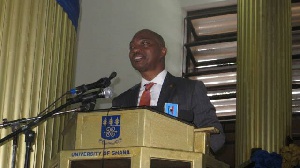Professor Emmanuel Akyeampong, the Oppenheimer Faculty Director, Harvard University Centre for African Studies, has urged the government to improve rural infrastructure to boost agriculture production.
He said agriculture had always proven to be the basis of building an economy as was recommended by Mr William Arthur Louis, Dr Kwame Nkrumah’s first Chief Economist, who drew a conclusion in his 1953 report on Egypt and Ghana.
Professor Acheampong, who is also the Ellen Gurney Professor of History and of Africa and African American Studies at Harvard University, said Mr Arthur Louis recommended that Egypt should focus on building import substitution companies while the then Gold Coast focused on agriculture, especially food crop production.
Prof Akyeampong made the remarks in his lecture on the first day of the 2018 Aggrey-Frazer-Guggisberg Memorial Lectures and Special Congregation dedicated to the 70th Anniversary of the University of Ghana (UG).
The lecture is on the topic: “Nkrumah, Cocoa, and the United States: The Vision of an Industrial Nation-State”.
He said the provision of infrastructure like good roads, water, electricity and the Internet was the responsibility of the state and it should be provided to increase productivity in the areas with arable lands.
He said Mr Arthur Louis said “once you can feed yourself and you can produce enough then you have your basis for manufacturing."
"The first line of industries are often agribusinesses, and adding value to agriculture produce," Prof Akyeampong said.
He said the recommendation made by Mr Arthur Louis was still relevant to the growth of the Ghanaian economy since the resource of the country had not changed significantly to make the suggestion obsolete.
Prof Akyeampong, who is also an alumna of UG said: “You first begin by feeding yourself and by bringing agriculture to that level of efficiency so that agriculture begins to provide the first line of agri-based businesses.”
He said in Ghana today, when comparing per capita, “we are more inefficient as farmers today than we were at the end of colonial rule, yet we seem not only to have declined in agriculture but we have skipped the manufacturing sector to the service sector."
He said, throughout history, there had not been any country, which had developed by skipping the manufacturing sector upon building a resilient agriculture sector.
He said 40-60 per cent of unfarmed arable land in the world today were located in Africa, yet the continent could not feed itself, adding that, “We are depending on food imports and on food aid".
He said: “If you have arable lands and you do not have good infrastructure, there is no way agriculture production is going to increase.”
Prof Akyeampong said countries outside Africa like China and the Arab countries were very interested in African lands because they were concerned about their own food security.
He said perhaps, African leaders could commence exploiting the models used by the Chinese.
He said the Chinese developed two models they used in their economic development thus the creations of special economic zones where they strategically choose a location to provide it with first world infrastructure with the condition that as that part of the country becomes a hub of growth, it would pull the other areas around it along.
He said they also used Agriculture Technology Demonstration Centers (ATDC), where they taught how to use fertilizer in soil, mechanisation and irrigation; adding that, the Chinese have built 25 of such ATDC in Africa, often upon request by African governments.
He said the challenge in Ghana was that farmers were untrained, unlike cocoa farmers in earlier centuries, who were thought how to space their crops, and their children who went to the farm with them also learnt.
“Today, children are not farming and the old cocoa farmers are old and they have left the industry.
"Farming is becoming hi-tech as the Chinese ATDC are showing and definitely illiterate farmers cannot be used to deploy these technologies,” he said.
He urged the government to encourage and make agriculture attractive for the youth, who were educated and were technology savvy to move into farming in ways that are profitable because the sector had been engulfed with high-level technologies in recent times.
Business News of Friday, 16 March 2018
Source: ghananewsagency.org

















